As a surfing club and community prospers in Virar, why don’t more people do this, we wonder
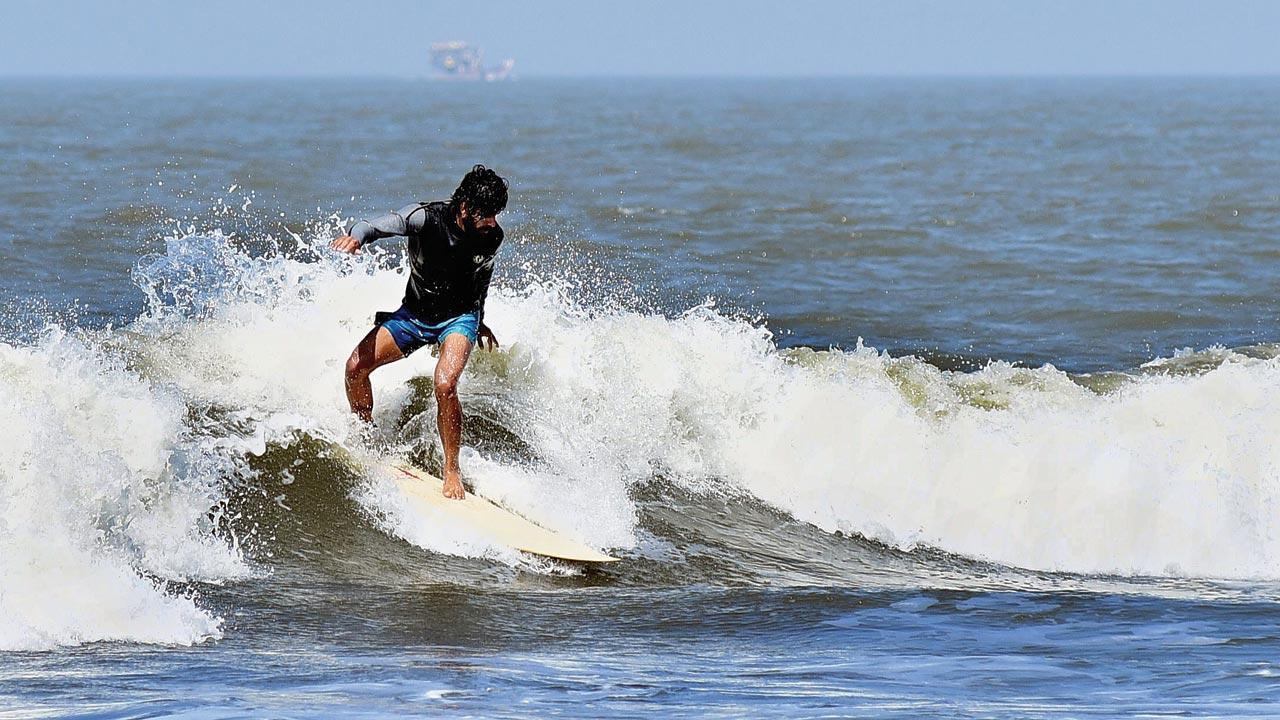
Surfers at Mumbai Surf School at the Rajodi Beach, a mere eight km from Virar railway station have become addicted to the sun, sand and surfboard. Pics/Nimesh Dave
Dreadlocks is the first thing we notice between the flashes of ocean, sand, and surfboards at Rajodi Beach, 8.2 km and an Rs 250 rickshaw ride from the Virar station.
Mr Dreadlocks is Adil Damania, an instructor with the Mumbai Surf Club established in 2018. Back then, the shack was a local garbage dumping spot and a shipping container served as a changing room.
Damania yells instructions to a nervously giggly group of three to four students, lying on their stomachs on surfboards parked in the sand. “Now, raise only your shoulders, hold the board from the sides, keep your legs stuck to the board…” It’s not smooth sailing when one tries to do this on a wave. More 20-year-olds trickle in, some struggle to stop their board from slipping from under their arms; others fly past as if it were a mere extension of their arm.
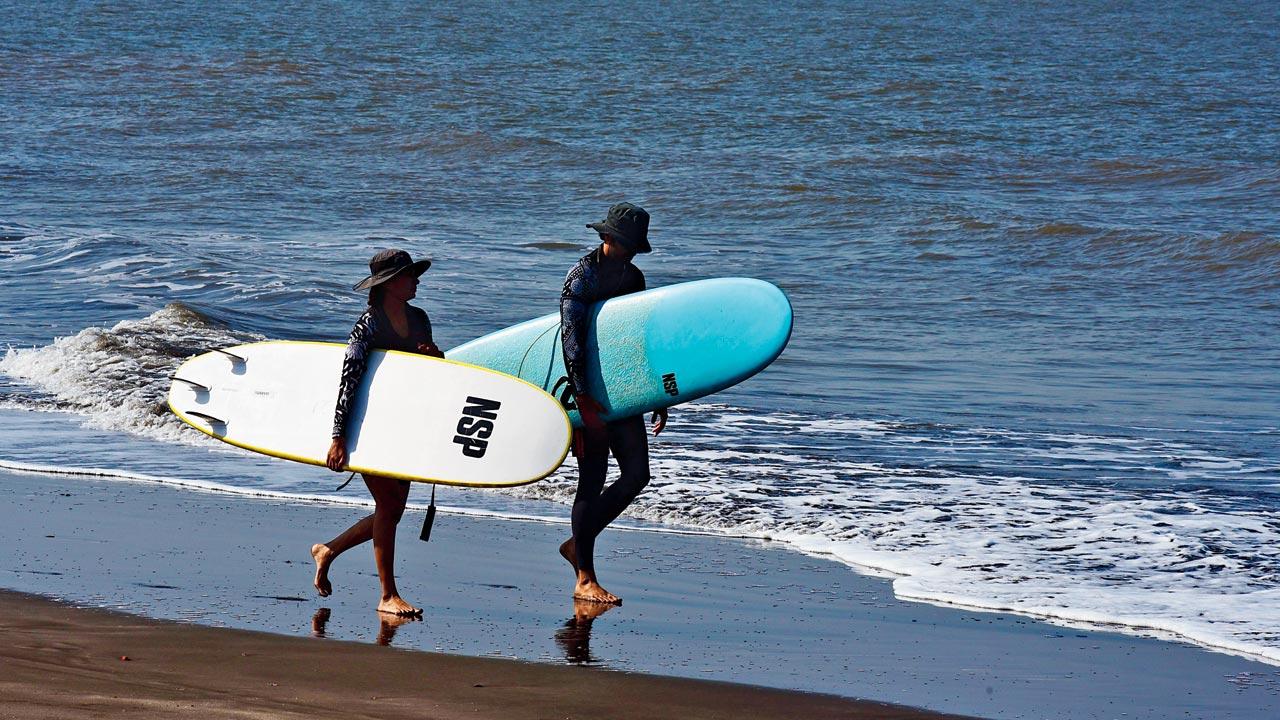
Among the latter is Vaishali Ramesh, who has been surfing on Rajodi Beach for almost three years. “I was born in Chennai, but grew up in Delhi,” says the banker from Andheri while sipping on nimbu paani, “When I moved here, I didn’t know many people. I was living in Airoli and would travel here on weekends. It’s been one-and-half years since I moved to Andheri and I am very glad I did. This place has all my free time.” The swell of a wave and the anticipation and elation to catch it releases dopamine. Summer is considered the quintessential surfing season since the waves during this season are known to be at its peak, thereby, providing the perfect weather conditions to catch the wave.
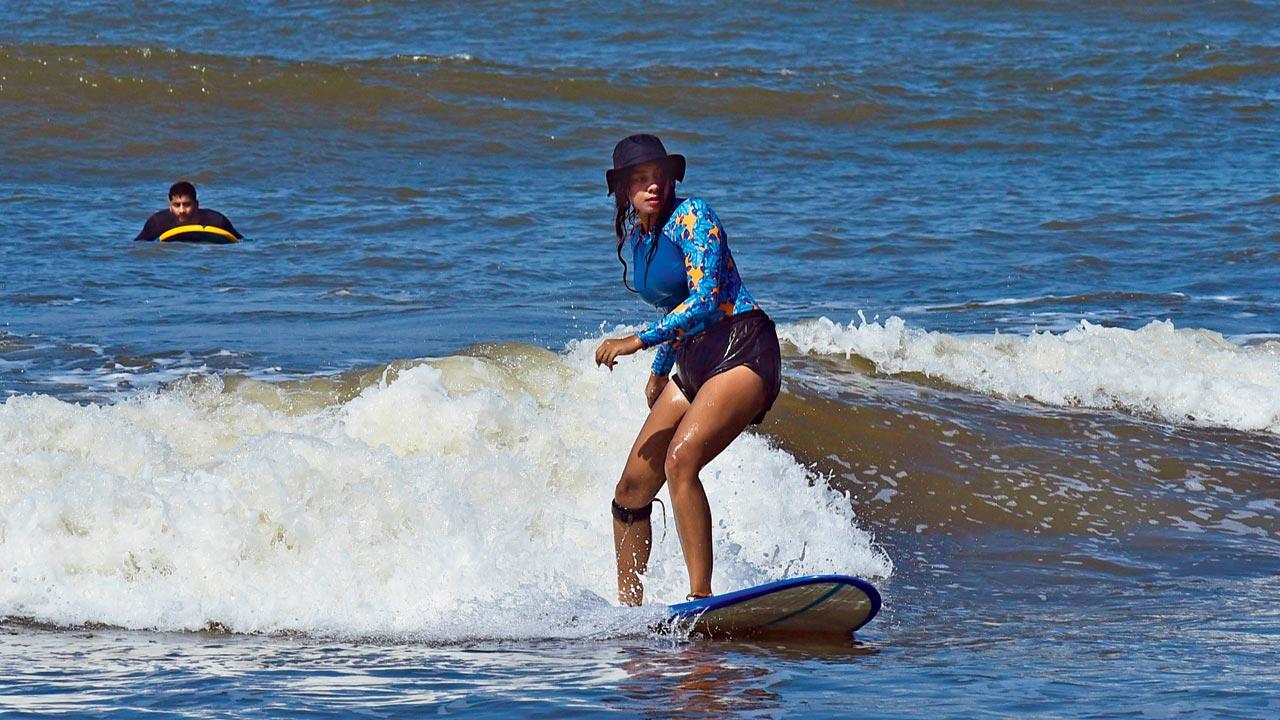
Akshay Chuttar has been religiously renewing his instructing licence [how often] with the Surfing Association of India (SAI); it’s granted under the aegis of the International Surfing Association (ISA) headquartered in the mecca of surfing, San Deigo, California.
The certification requires five days of agility tests to assess how one handles a surfboard as well as the ability to rescue someone in danger. The exams are usually held in different states. “Since the sport is pursued by very few in the country, the certification process is not as stringent as in other countries,” Chuttar says. “Most of us learn from other instructors. You have to do some additional exercises for strength training to be in this career. This is not common knowledge.”
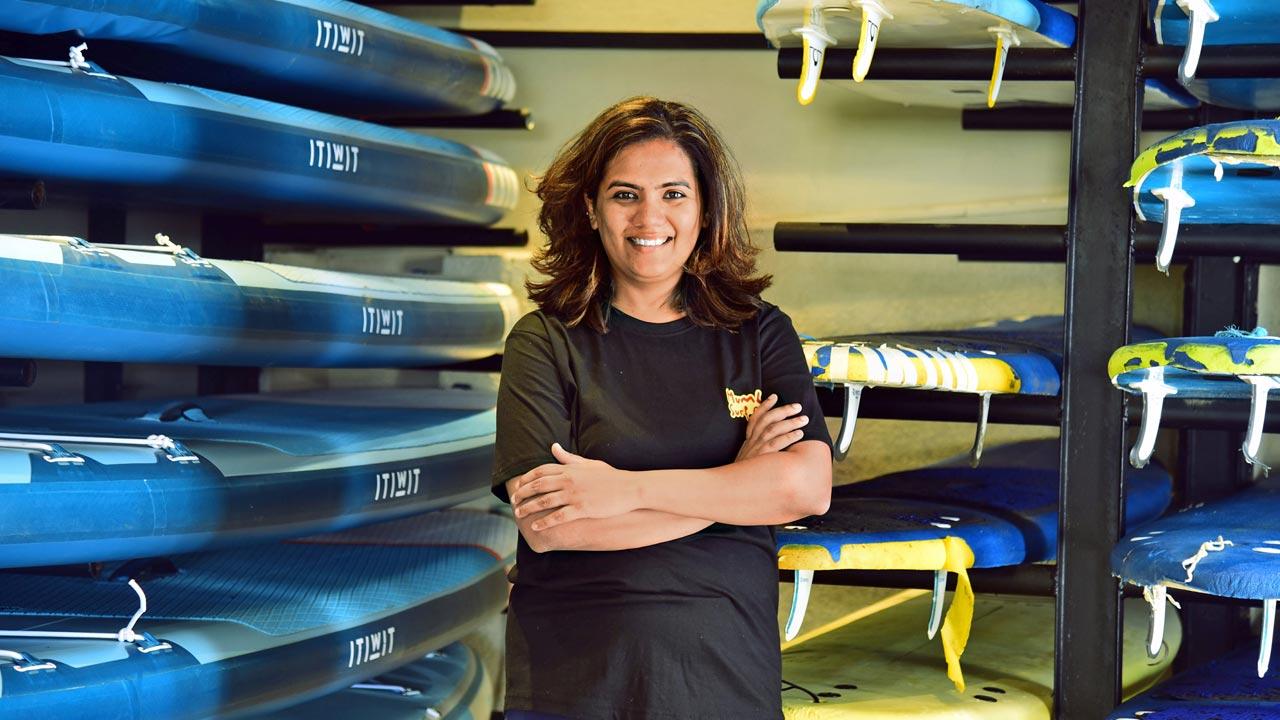 Preeti Rawat says that the surf school has taken all their savings as it is an expensive sport. The surfboards alone cost up to Rs 30,000
Preeti Rawat says that the surf school has taken all their savings as it is an expensive sport. The surfboards alone cost up to Rs 30,000
This small community of surfers and instructors didn’t crop up overnight.
One of the early birds was Prathmesh Matre, a Virar resident, who came to check out the club in 2019. “I was very happy to have something more to do on weekends other than clubbing,” he says, “I had surfed before but there was no place for it in Mumbai; I grabbed the opportunity with both hands”
Matre, now a pro, rents out a surfboard and heads to the Arabian Sea. “This beach is great for beginners as the waves are only three to four feet high, and there are no jagged rocks on the beach you could crash into,” he says.
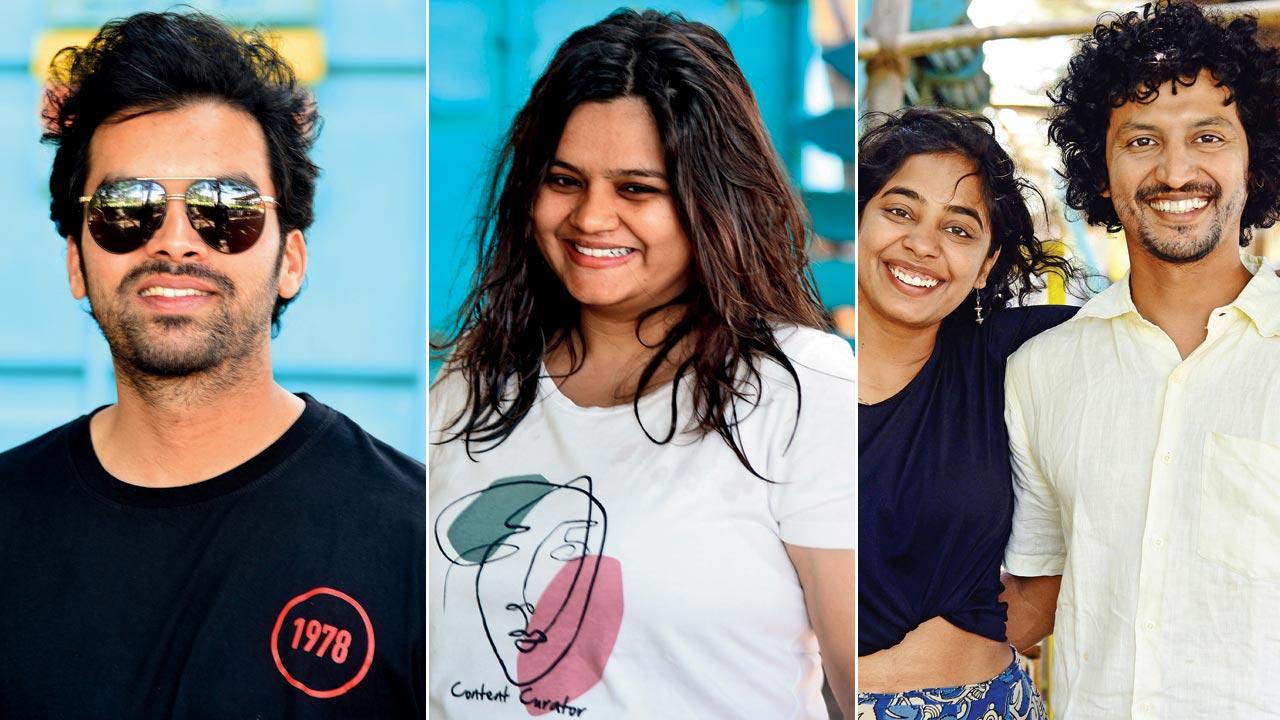 Prathmesh Matre; Shikha Dholakia; Vaishali Ramesh and Akshay Chuttar
Prathmesh Matre; Shikha Dholakia; Vaishali Ramesh and Akshay Chuttar
If things are so good, why is the Mumbai Surf Club the only one around?
“Because it takes effort to find a beach with surfing potential,” says Preeti Rawat, who founded the Club with spouse Suyash Rawat. “And knowledge to see that potential, and patience to build a business around it.”
Suyash, a doctor by profession, tested various beaches with his board before settling on this small section of Rajodi. “We are the only licensed surf club in the city,” says Preeti, four-month-old daughter Gaya on hip. “No one else has taken the trouble to find a surfable beach, and go through the red tape to acquire a licence from SFI and the Maharashtra Tourism Development Corporation.”
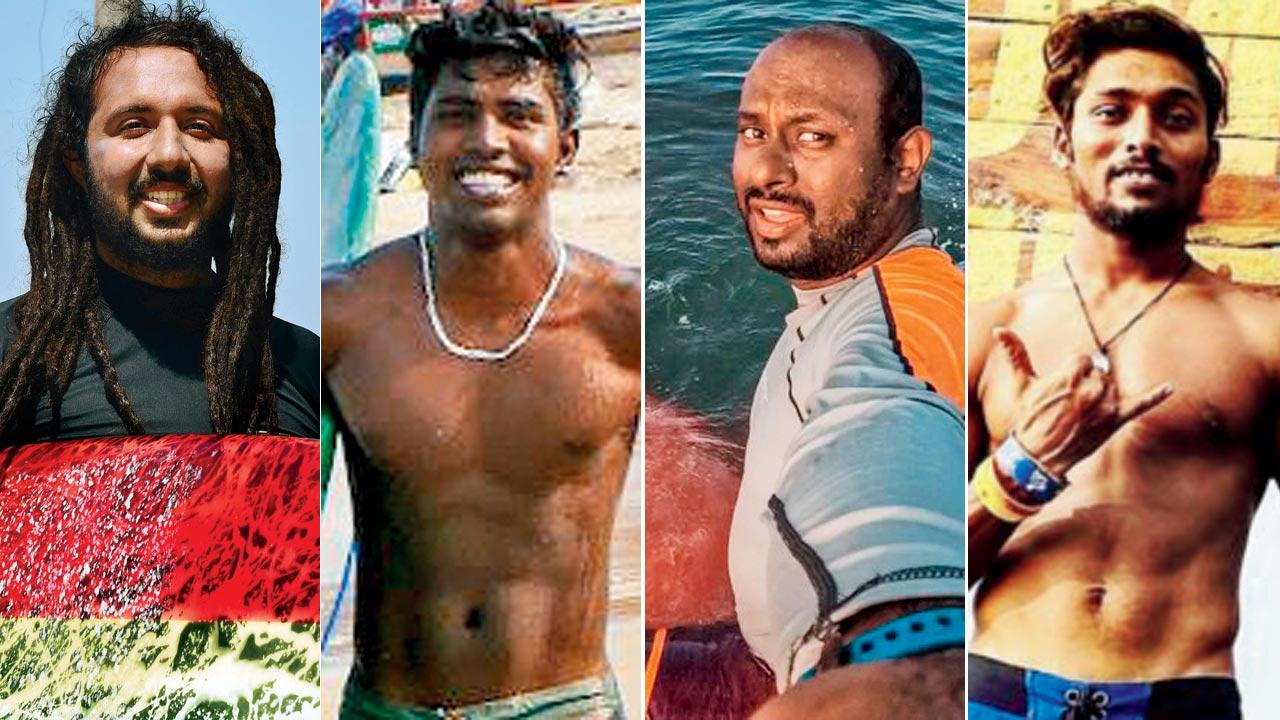 Adil Damania; Sujith Vikaraman; Rammohan Paranjpe and Krishna
Adil Damania; Sujith Vikaraman; Rammohan Paranjpe and Krishna
Not just a fledging hobby, serious surfers feel the sport has the potential to boost tourism; something the state should awaken to soon, like Orissa, Kerala and Goa have. Like Raffael Kably, who moved from Khar to Kerala for the waves, and was the director of the Soul and Surf school in Varkala. “In Maharashtra, we have a bit of a challenge in tourism,” he says. “If you go surfing in Goa, Kerala and even Orissa, there are hotels around, and more importantly, lifeguards. Those who want to free surf on their own, know a lifeguard will fish them out if they get pummelled by continuous waves.”
It is no secret that most Indians do not know how to swim. According to a 2020 report on Accidental Deaths & Suicides in India (ADSI) 83 people died by accidental drowning in 2018 alone.
Kably, a chef by profession, moved back to Mumbai only last year. Though he learned to ride the waves as a kid and is now in his late 30s, he has never surfed in Mumbai’s waters. “I wouldn’t know where to begin,” he shrugs.
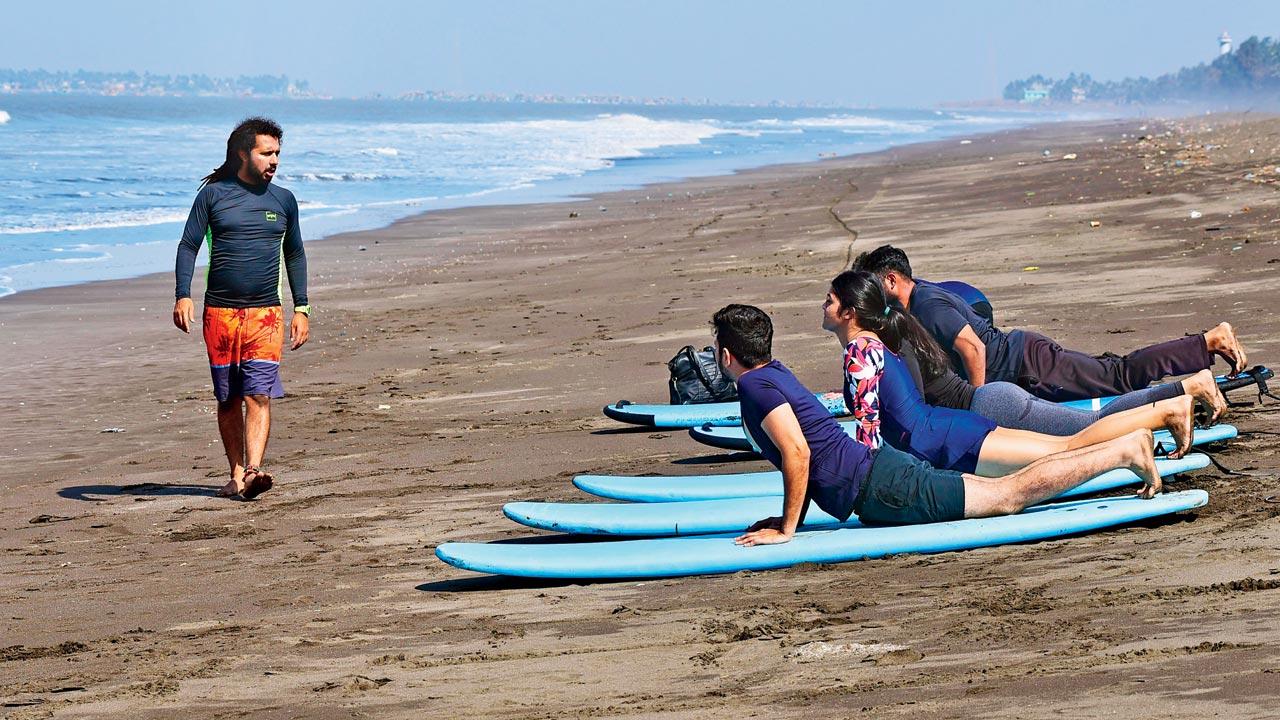 First timers are taught how to balance themselves on a surfboard at Rajodi
First timers are taught how to balance themselves on a surfboard at Rajodi
Sujith Vikraman, who has been an instructor at Kallialay Surf School on Varkala Beach since 2009, found spots of surfing heaven in Kerala through trial and error. “We would open Google Maps, and drive down the Kerala coast,” he says. “We tested the waves, and found Varkala and Edava beaches where the waves have a perfect breaking point.”
He says Maharashtra’s coastline holds a lot of potential. “There are many rocks on the beach,” he says, “which is good to break large waves. Imagine a soup spilling out of a bowl with a high edge; the splash will be higher.” But one opinion is that the waves in Maharashtra are favourable only in summer.
The outlook towards running a surf school cannot be casual, just because the nature of the sport is, says Krishna. A Karnataka native, he started a surf school in Malwan’s Tarkarli Beach, which he shut after two years. “One board costs Rs 25,000 to Rs 30,000 each and you need 50 of them if you want to enough students to keep yourself afloat,” he says. “Also, until you tell people about your classes, they won’t know. So, you need a website and need to make enough noise on social media and hence be an expert in that too,” says Krishna over the phone from Goa, where he is currently teaching.
To keep himself relevant and keep making money, Krishna keeps moving state to state, surf to surf. He will finally settle down in Kolam Beach by peak summer. “One needs to renew the surf school license every year. That, too, entails serious expenses. I couldn’t manage it all on my own and shut it down by the end of 2022,” he signs off.
SFI vice-president and founding member Rammohan Paranjpe says one of the biggest factors that helps surfing take off anywhere is state support. “There is either a lack of interest or know-how by the Maharashtra Tourism Department about how to provide an environment conducive to surfing.” The area can’t just be about surfing, but also be a place to relax, eat and encourage nightlife. “Mumbai water is generally extremely dirty and many people don’t want to surf there. But there is a lot of potential in Maharashtra. We just got a request to start a school in Dapoli, we just conducted a survey and it looks doable. It also means that whoever does start the school will need at least R20 lakhs and above and they won’t break even for a few years. It’s tough finding business partners for these ventures because most people might not understand how surfing works” says Paranjpe, adding that surf schools need to be run with those who are passionate about surfing as well as have a sound business sense—a tough combination in general.
Rawat concurs, “Even though this might look like fun and play, it is finally a business and it is a surf school not a beachside cafe. I get a lot of people who want to only come and chill here, but unless they take a lesson, I do not let them stay over in the dorms.” To break even, the school has recently added two cottages and added a wooden roof to the common area and one of the instructors also takes yoga sessions for those who want to stretch before and after a surfing session.
Rawat keeps food costs low by providing only finger food during the morning, and asking visitors to order food in advance. Lunch and dinner is cooked by Suyash’s parents, who drive down with the food. There are hardly any hotels around Rajodi, which is one of the reason’s says Rawat, that causes difficultly in accessing the beach.
But those who make the effort are reaping the benefits. Shikha Dholakia waits for her chance at a wave. “I used to work in a very high-stress job,” says the marketing executive from Virar, “I got fed up, quit, and began my small firm from home. I started to surf to do more with life than just kill time over the weekend. I am still learning, but I have waited two summers for these perfect waves.”
 Subscribe today by clicking the link and stay updated with the latest news!" Click here!
Subscribe today by clicking the link and stay updated with the latest news!" Click here!








